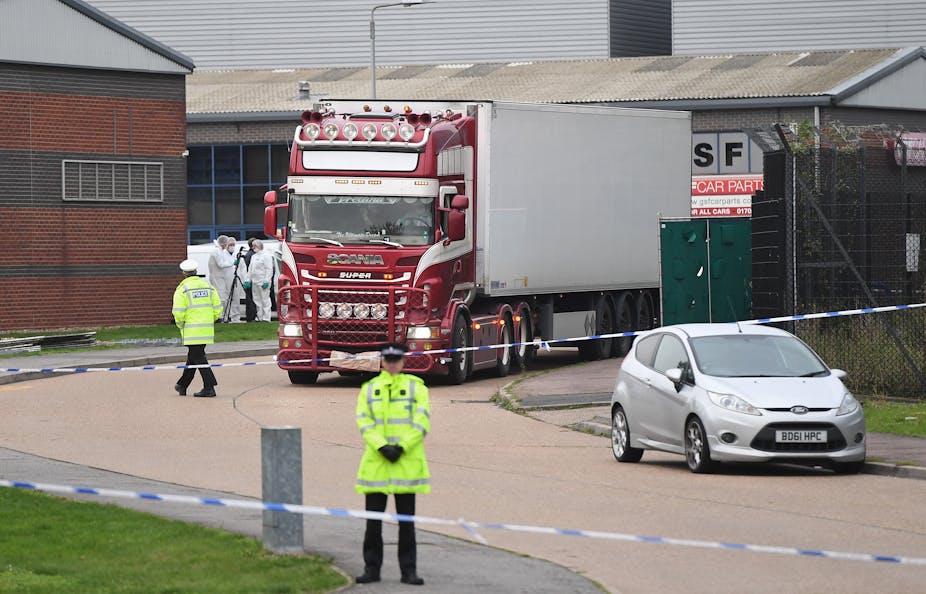Just as news emerged of the shocking deaths of 39 people, whose bodies were found in a refrigerated lorry in Essex, southeast England, I was speaking at workshop in London about tackling modern slavery within the UK’s Chinese community.
My general hypothesis, drawing from ongoing research with Chinese migrants and the police, was that the tragedies that happened in 2000, when 58 Chinese migrants were found dead in a lorry in Dover, and in 2004 when 23 Chinese cockle-pickers working for a gang died on a beach in Morecambe, were now much less likely.
Clearly I was mistaken. The tragic deaths of the 39 migrants, initially identified as Chinese, caught law enforcement officers and researchers by surprise.
While the identities and journey taken by those found in Essex is not clear, historically there has been a long-established migration of migrants from China’s Fujian province to the UK. Several studies confirm that these migrants are motivated by a mixture of pull and push factors. Areas in Fujian are relatively wealthy, partly due to previous migrations and the scale of remittances this brought to the area. This in turn, encourages further chain migration.
China is now one of the most unequal societies in the world, and a combination of relative deprivation alongside exaggerated notions of the ease at reaching the UK and earning money upon arrival, still makes it a sought after journey.
It’s possible the numbers making the journey from Fujian could be decreasing, partly due to the Chinese economy’s continuing strength, and the UK’s currency relative decline. But at the same time, new migrants are coming to the UK from poorer areas of China, such as Jilin and Liaoning.
Shift in routes
Estimates of numbers of Chinese migrants living with irregular immigration status in the UK are both dated and inexact. But in 2014, following a Freedom of Information request, the government published data estimating that there are still thousands of smuggled migrants arriving in the UK from China and hundreds of irregular Chinese migrant workers arrested each year.
Yet it’s also been suggested to my colleagues and me during our ongoing research that relatively few Chinese migrants are caught clandestinely entering the UK. There has been a move away from the long journeys across Europe with the frequent use of lorries. Instead, smugglers are thought to be focusing their efforts on providing counterfeit or stolen documents to help Chinese migrants get visas for countries such as Cyprus or Latvia in the Schengen area. These countries may have less stringent visa checks and processes than the UK, and travelling onto the UK with these visas is less difficult. Smugglers also then advise migrants to misuse their visas to overstay in the UK. Overall, the effect has been a shortening of the time it takes for most to reach the UK and a reduction in the price of a journey to the UK from China.
Those involved in organising the journey are known as “snakeheads” – mostly small, entrepreneurial and loose groupings that come together to facilitate a specific type of criminality, in this case smuggling. Broadly speaking their members are not organised career criminals or part of Chinese triad gangs, and they eschew other serious criminality such as drug or firearms distribution.

Exploitation on the rise
Yet, at the same time, there seems to be growing evidence of another more dangerous and exploitative trade working alongside the smugglers. Since 2016, Chinese nationals are consistently the fourth most frequently trafficked nationalities according the National Referral Mechanism, the UK’s tool used to determine whether someone is a victim of trafficking or not. Between 2017 and 2018 there was a sudden 54% rise in the number of alleged victims from China. Those referred are disproportionately victims of sexual exploitation, be that modern day slavery or trafficking.

Our recent London seminar included accounts of an expanding Chinese sex trade based in London, which includes the exploitation of trafficking victims.
While the Chinese community in the UK is overwhelmingly law abiding, more reports are emerging of serious and organised Chinese crime groups operating in the UK. These are either involved in the sex business or playing key roles as money launderers for their own activities and for others.
In my own recent research, my colleagues and I argued that in Chinese provinces away from Beijing, where the communist party’s control is at its zenith, there remains evidence of successful crime groups involved in counterfeit cigarette and synthetic drug production and distribution to the UK.
Fruitful intelligence sharing between Chinese and British law enforcement officers remains a problem because China retains the death penalty for many offences. Therefore the UK cannot share intelligence which might lead to its use in China. Meanwhile, in the UK, police understanding of smuggling groups and of trafficking is limited by its lack of language capabilities and long-standing issues of intelligence sharing. It’s clear that the multiple British law enforcement agencies involved in policing this issue need to get better at it to help prevent any more tragedies like the one in Essex.

